|
Books Should Be Free Loyal Books Free Public Domain Audiobooks & eBook Downloads |
|
|
Books Should Be Free Loyal Books Free Public Domain Audiobooks & eBook Downloads |
|
Non-fiction |
|---|
|
Book type:
Sort by:
View by:
|
By: Adelia Belle Beard and Lina Beard | |
|---|---|
 On the Trail
On the Trail
On The Trail, An Outdoor Book For GirlsBy Lina Beard And Adelia Belle BeardPRESENTATION The joyous, exhilarating call of the wilderness and the forest camp is surely and steadily penetrating through the barriers of brick, stone, and concrete; through the more or less artificial life of town and city; and the American girl is listening eagerly. It is awakening in her longings for free, wholesome, and adventurous outdoor life, for the innocent delights of nature-loving Thoreau and bird-loving Burroughs... | |
By: Adin Ballou (1803-1890) | |
|---|---|
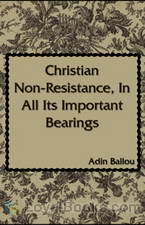 Christian Non-Resistance, In All Its Important Bearings
Christian Non-Resistance, In All Its Important Bearings
In this short book, Ballou defends the notion that non-resistance (today we call it non-violence) is the superior Christian method, and the one practiced by Jesus himself. | |
By: Adoniram Judson Ladd | |
|---|---|
 On the Firing Line in Education
On the Firing Line in Education
| |
By: Advisory Committee on Human Radiation Experiments | |
|---|---|
 Final Report of the Advisory Committee on Human Radiation Experiments
Final Report of the Advisory Committee on Human Radiation Experiments
Researchers in the United States have performed thousands of human radiation experiments to determine the effects of atomic radiation and radioactive contamination on the human body. Most of these tests were performed, funded, or supervised by the United States military, Atomic Energy Commission, or various other U.S. federal government agencies. The experiments included a wide array of studies, involving things like feeding radioactive food to mentally disabled children, deliberately releasing radioactive chemicals over U... | |
By: Agnes Ethel Conway (1885-1950) | |
|---|---|
 The Book of Art for Young People
The Book of Art for Young People
This is a charming book on Art History for children (and everyone else). Each chapter focuses on a great painting, reproduced in color in the original text. The authors explain the story behind the paintings, as well as the life, times, and techniques of the artists. | |
By: Agnes Repplier (1855-1950) | |
|---|---|
 Americans and Others
Americans and Others
A collection of sometimes biting, always clever commentaries on some of life's foibles -- as apt today as when Ms. Repplier wrote them in 1912. Though less know to modern readers, Repplier was in her prime ranked among the likes of Willa Cather. Note: Section 13 contains the word niggards. I put it in print here so that it will not be mistaken for a racial epithet when heard. (written by Mary Schneider) | |
 In Our Convent Days
In Our Convent Days
With her usual wit and charm, Ms. Repplier recalls her days at Eden Hall, the Convent of the Sacred Heart in Torresdale, north of Philadelphia. She shares the highlights (and some of the low lights) of her time there. Perhaps this sharp eye, nurtured by her willfulness and independent spirit, was the reason she was not invited to return to Eden after her second year. Not only Catholics or boarding school alumnae will find this book entertaining; anyone who went to school or who looks back on their childhood will see their own experience somewhere in this memoir. | |
By: Agnes Strickland, Elisabeth Strickland (1796-1874) | |
|---|---|
 The Lives of the Queens of England Volume 3
The Lives of the Queens of England Volume 3
The Lives of the Queens of England is a multi-volumed work attributed to Agnes Strickland, though it was mostly researched and written by her sister Elizabeth. These volumes give biographies of the queens of England from the Norman Conquest in 1066. Although by today's standards, it is not seen as a very scholarly work, the Stricklands used many sources that had not been used before.Volume three includes the biographies of Isabella of Valois, Joanna of Navarre, Katherine of Valois, Margaret of Anjou, Elizabeth Woodville and Anne of Warwick. (Introduction by Ann Boulais) | |
By: Agnes von Blomberg Bensly | |
|---|---|
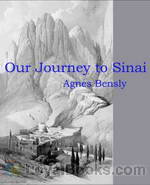 Our Journey to Sinai
Our Journey to Sinai
Fortress-walled Saint Catherine's monastery on the Sinai peninsula has been a pilgrimage site since its founding by the Byzantine Emperor Justinian in the 6th century. According to tradition, the monastery sits at the base of the mountain where Moses received the Tablets of the Law. Set in rugged country, accessible in times past only by a many days journey by camel across barren desert, the monastery survived intact through the centuries, and, as a result, became a rich repository of religious history—told through its icons, mosaics, and the books and manuscripts in the monastery library... | |
By: Aiden Wilson Tozer (1897-1963) | |
|---|---|
 The Pursuit of God
The Pursuit of God
"As the heart panteth after the water brooks, so panteth my soul after thee, O God." This thirst for an intimate relationship with God, claims A.W. Tozer, is not for a select few, but should be the experience of every follower of Christ. But, he asserts, it is all too rare when believers have become conditioned by tradition to accept standards of mediocrity, and the church struggles with formality and worldliness. Using examples from Scripture and from the lives of saints who lived with this thirst for God, Tozer sheds light on the path to a closer walk with God. | |
By: Alan [Editor] Story | |
|---|---|
 The Copy/South Dossier Issues in the economics, politics, and ideology of copyright in the global South
The Copy/South Dossier Issues in the economics, politics, and ideology of copyright in the global South
| |
By: Alban Butler (1711-1773) | |
|---|---|
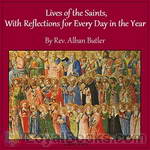 Lives of the Saints, With Reflections for Every Day in the Year
Lives of the Saints, With Reflections for Every Day in the Year
Compiled from the much larger 12 book set of "Butler's Lives of the Saints", this volume contains short biographies of the Saints, for each day of the year, followed by a reflection for each entry. | |
By: Albert Bigelow Pain | |
|---|---|
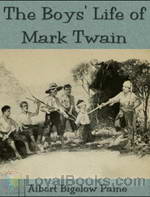 The Boys' Life of Mark Twain
The Boys' Life of Mark Twain
Albert Bigelow Paine was Samuel Langhorne Clemens’ (Mark Twain’s) biographer. He lived with Twain, collecting ideas and material for a biography, for a few years before Twain’s death in 1910. Six years later Paine published this “story of a man who made the world laugh and love him.” For those who have read or listened to Mark Twain’s works, Paine’s work is an invaluable resource to better understand Twain, the stories behind his stories and his life with those he loved and with whom he worked. | |
By: Albert Einstein (1879-1955) | |
|---|---|
 Relativity: The Special and General Theory
Relativity: The Special and General Theory
Einstein wrote this book for people who are interested in understanding the Theory of Relativity but aren't experts in scientific and mathematical principles. I'm sure many people have heard about Einstein's Theory of Relativity, but most of them don't really know what it is all about. This book gives them a chance to know more about this very famous theory without the need to take a Physics course first. This book is divided into three parts. The first part explains what special relativity is all about... | |
 Sidelights on Relativity
Sidelights on Relativity
Sidelights on Relativity contains ETHER AND THE THEORY OF RELATIVITY, an address delivered on May 5th, 1920, in the University of Leyden; and GEOMETRY AND EXPERIENCE, an expanded form of an address to the Prussian Academy of Sciences in Berlin on January 27th, 1921. (Intro from Project Gutenberg) | |
By: Albert H. Benson | |
|---|---|
 Fruits of Queensland
Fruits of Queensland
| |
By: Albert Keim (1876-1947) | |
|---|---|
 Louis Pasteur
Louis Pasteur
Louis Pasteur famously said, "In the fields of observation chance favors only the prepared mind." Pasteur brought to the study of chemistry, microbiology, and applied immunology, a mind open, innovative, and insightful. Born of peasant stock in the French Jura, he worked with dogged determination all his life and often in the face of strenuous opposition. Through an unbroken succession of rigorously designed and meticulously performed experiments, Pasteur developed veterinary vaccines and halted grievous losses in the French wine, silk, and dairy industries... | |
By: Albert Schweitzer (1875-1965) | |
|---|---|
 The Quest of the Historical Jesus
The Quest of the Historical Jesus
In this book, Schweitzer traces the historical progress of 'Historical Jesus' research, from Hermann Reimarus in the mid 18th century, to William Wrede at the turn of the 20th. Schweitzer showed how Jesus' image had changed with the times and with the personal proclivities of the various authors. He concluded with his own synopsis and interpretation of what had been learned over the course of the previous century. He took the position that the life of Jesus must be interpreted in the light of Jesus' own convictions, which he characterized as those of late Jewish eschatology. (Introduction from Wikipedia, modified by JoeD) | |
 J.S. Bach, Volume 1
J.S. Bach, Volume 1
An analysis of Johann Sebastian Bach's life and musical compositions, and of the artistic, philosophical, and religious world in which he acted. (Introduction by Kathleen Norland) | |
By: Albertus Magnus (1193-1280) | |
|---|---|
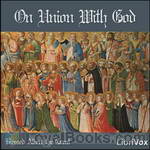 On Union With God
On Union With God
Surely the most deeply-rooted need of the human soul, its purest aspiration, is for the closest possible union with God. As one turns over the pages of this little work, written by Blessed Albert the Great towards the end of his life, when that great soul had ripened and matured, one feels that here indeed is the ideal of one's hopes. (From the Preface) | |
By: Alexander Aaronsohn (1888-1948) | |
|---|---|
 With the Turks in Palestine
With the Turks in Palestine
While Belgium is bleeding and hoping, while Poland suffers and dreams of liberation, while Serbia is waiting for redemption, there is a little country the soul of which is torn to pieces—a little country that is so remote, so remote that her ardent sighs cannot be heard.It is the country of perpetual sacrifice, the country that saw Abraham build the altar upon which he was ready to immolate his only son, the country that Moses saw from a distance, stretching in beauty and loveliness,—a land of promise never to be attained,—the country that gave the world its symbols of soul and spirit... | |
By: Alexander Berkman (1870-1936) | |
|---|---|
 Bolshevik Myth
Bolshevik Myth
The Bolshevik Myth is a book by Alexander Berkman who with his partner Emma Goldman was deported from the USA under the 1918 Anarchist Exclusion Act and shipped to the young Soviet Russia. He describes his experiences in Bolshevik Russia from 1920 to 1922, where he saw the aftermath of the Russian Revolution of 1917. Written in the form of a diary, The Bolshevik Myth describes how Berkman's initial enthusiasm for the revolution faded as he became disillusioned with the Bolsheviks and their suppression of all political dissent... | |
By: Alexander Darroch (1863-1910) | |
|---|---|
 The Children: Some Educational Problems
The Children: Some Educational Problems
| |
By: Alexander Hamilton (1755/1757-1804) | |
|---|---|
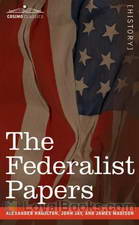 The Federalist Papers
The Federalist Papers
In order to promote the ratification of the United States Constitution in the late 1780s, Alexander Hamilton, James Madison and John Hay wrote a series of 85 articles and essays explaining their reasons to support the constitution. Most of these articles were published in The Independent Journal and The New York Packet and they later became known as “The Federalist Papers.” In reading the articles, one will encounter very interesting issues like Hamilton’s opposition to including the Bill of Rights in the Constitution and why he thinks a Union is better than a Confederation... | |
By: Alexander Kinglake | |
|---|---|
 Eothen, or Impressions of Travel brought Home from the East
Eothen, or Impressions of Travel brought Home from the East
A classic of Victorian travel writing, Kinglake’s book describes his journey through the Ottoman empire to Cairo, and his residence there in time of plague. | |
By: Alexander Pope (1688-1744) | |
|---|---|
 An Essay on Man
An Essay on Man
Pope’s Essay on Man, a masterpiece of concise summary in itself, can fairly be summed up as an optimistic enquiry into mankind’s place in the vast Chain of Being. Each of the poem’s four Epistles takes a different perspective, presenting Man in relation to the universe, as individual, in society and, finally, tracing his prospects for achieving the goal of happiness. In choosing stately rhyming couplets to explore his theme, Pope sometimes becomes obscure through compressing his language overmuch... | |
By: Alexander Sutherland Neill (1883-1973) | |
|---|---|
 A Dominie in Doubt
A Dominie in Doubt
| |
By: Alexander von Humboldt (1769-1859) | |
|---|---|
 Cosmos: A Sketch of a Physical Description of The Universe: Introduction
Cosmos: A Sketch of a Physical Description of The Universe: Introduction
Friedrich Wilhelm Heinrich Alexander von Humboldt was a Prussian geographer, naturalist, explorer, and influential proponent of romantic philosophy. Many consider him to be the last of the great polymaths. After his death in 1859, the scientific world began to divide into separate disciplines, each with its own knowledgeable but narrowly defined experts. Humboldt’s mind encompassed all that was then known of nature in one great whole. He could well be considered the father of modern ecology and earth studies... | |
By: Alexandre Dumas (1802-1870) | |
|---|---|
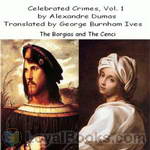 Celebrated Crimes
Celebrated Crimes
Dumas's 'Celebrated Crimes' was not written for children. The novelist has spared no language -- has minced no words -- to describe the violent scenes of a violent time.In some instances facts appear distorted out of their true perspective, and in others the author makes unwarranted charges. The careful, mature reader, for whom the books are intended, will recognize, and allow for, this fact.The first volume comprises the annals of the Borgias and the Cenci. The name of the noted and notorious Florentine family has become a synonym for intrigue and violence, and yet the Borgias have not been without stanch defenders in history... | |
By: Alexandre Exquemelin (c. 1645-1707) | |
|---|---|
 The Pirates of Panama
The Pirates of Panama
This volume was originally written in Dutch by John Esquemeling, and first published in Amsterdam in 1678 under the title of De Americaeneche Zee Roovers. It immediately became very popular and this first hand history of the Buccaneers of America was soon translated into the principal European languages. The first English edition was printed in 1684. Esquemeling served the Buccaneers in the capacity of barber-surgeon, and was present at all their exploits. Little did he suspect that his first hand observations would some day be cherished as the only authentic and true history of the Buccaneers and Marooners of the Spanish Main... | |
By: Alexis de Tocqueville (1805-1859) | |
|---|---|
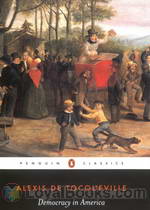 Democracy in America
Democracy in America
Arguably, one of the most influential and insightful pieces of work concerned with American political life, Democracy in America directs itself towards American politics and society, and is considered to be one the best books written on the subject. Published in 2 volumes, in 1835 and 1840, Tocqueville records his findings after studying the thriving nation in his nine month exploratory journey. The young French aristocrat first came to America on an official assignment to study the American penal system, but instead used this as a pretext to study American society... | |